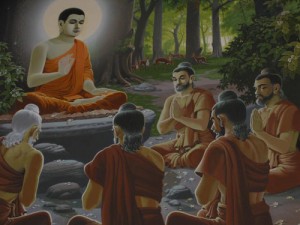The following is an excerpt from a teaching by Jetsunma Ahkon Lhamo called “AA & Buddhism”
In our program, remorse and confession are really important. Now in AA, are you supposed to confess so that you could feel like a real jerk? That really isn’t the point, is it? No, it isn’t. And it’s the same thing in Buddhadharma. The point of confession is not so that you can beat yourself or wear a hair shirt or something like that. You know, mea culpa, or whatever. It isn’t like that. It really isn’t like that. The point of confession and remorse is truth. The point of confession and remorse is that you can’t go forward while you’re hiding something. And that’s true in our practice. We can’t. Those of you who find yourself stuck in your practice, don’t you know that that’s why? You can’t go forward while you’re hiding something. We do hide things. We pretend that we are Miss Nun Goodbar, something like that. I’m trying to think of an appropriate terminology. Miss Little Angelic Nun or Mr. Wonderful Monk. None of the monks are here, that’s scary. Where are they? Well, I guess they’re not such angels, are they?
Anyway, you pretend that you’re Miss Wonderful-I’ve-Got-It-Together Practitioner; and that’s when you stop practicing. That’s when you’re finished. Spiritually, you are finished then. You might as well dig a hole and jump in. And it’s the same with addiction, isn’t it? The minute you decide that you don’t have a problem…, and that happens to addicts actually. They’ll go through the program and they’ll sober up; and they’ll get there for a while and suddenly they’ll say, ‘Well, really I’m pretty good now. I don’t think I have a problem anymore.’ The minute you decide you don’t have a problem anymore, you’ve got a big problem because you’re about to start drinking again. You’re going to do something that’s going to find you in the same hole. Isn’t that true? Isn’t that true?
Well, it’s the same with our practice. It’s the same with our practice. So, we’re constantly involved in confession and remorse. That’s constantly a part of our practice. We’re constantly involved in dismantling cyclic existence and looking at its faults. We are constantly involved in seeing the truth. Is an addict’s life easy? Is recovery easy? No. That’s why we have to do it one day at a time. And it’s the same with our practice. One day at a time. Because it’s not easy. But the thing about it that really makes you realize you’ve got to do it is that if being a recovered alcoholic is not easy, then being a drunk is much harder, because it’s awful. It’s not acceptable. It’s simply not acceptable. Do you agree? It’s not acceptable. You can’t live like that. And it’s the same thing with samsara. To work through samsara as a proper Buddhist practitioner, to catch that boat and take it to the other side, is not easy. Honesty is required. But it makes you potent. That honesty potentizes your practice. It makes it possible. The alternative of just drifting and wandering aimlessly through samsara like a person who is blind trying to get through a room of obstacles is simply not acceptable. Experiencing death and rebirth and coming out of it with only your habitual tendency every time since time out of mind is not acceptable.
Once we have achieved a state of happiness (and that can only happen when samsara is completely dismantled), then we consider that we are moving toward enlightenment. The good news about all this is that even in Alcoholics Anonymous you never are actually totally recovered; and you never stop thinking of yourself as an addict who has to think in a certain way. The one thing that the Buddha has taught that we have to consider that takes it one step further, and that as an addict we should all consider, is that there is an end to suffering. And that end to suffering is called enlightenment. That it’s going to be hard work maybe isn’t the best news you’ve ever heard. We all want to say I want a religion in which you just call on somebody and they just save you. Everybody wants that. But that’s like an addict saying I want a drug that’s just going to feel good forever. It’s never going to happen. It’s never going to happen like that. I wish it would. I’d like to give that to you. But it’s not.
Copyright © Jetsunma Ahkon Norbu Lhamo All rights reserved

